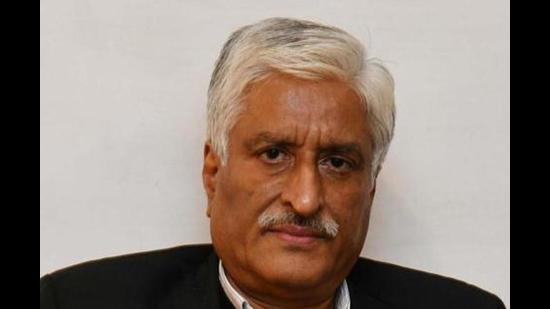

EDITED BY
Advocate Sanjeev Sirohi
The Punjab and Haryana High Court, while allowing the habeas corpus petition filed by the wife of former DGP Sumedh Singh Saini ordered his release from the custody of the State Vigilance Bureau calling his arrest ‘patently illegal’. A single Judge Bench of Justice Arun Kumar Tyagi ordered his release just over 24 hours after he was arrested by the Vigilance Bureau in alleged cheating, forgery, corruption case. He has been booked under Sections 409, 420, 467, 468, 471, and 120-B of the IPC and Sections 13(1)(a) read with Section 13(2) of the Prevention of Corruption Act, 1988. [Shobha v. State of Punjab and Others]
Factual Background
The petitioner filed the instant criminal writ petition under Article 226 of the Constitution of India seeking the following reliefs:-
(i) Issuance of the writ in the nature of habeas corpus directing the respondents to produce the detenue Sumedh Singh Saini who is under mala fide and illegal detention of Vigilance Bureau at Vigilance Bhawan, SAS Nagar (Mohali) without any cause of action in spite of obtaining protection Orders from Punjab and Haryana High Court, in response to an FIR under Sections 13(1)(b) read with Section 13(2) of the Prevention of Corruption Act, 1988 as amended by the Prevention of Corruption (Amendment) Act, 2018 and Sections 109 and 120-B of the IPC;
(ii) Appointment of Warrant Officer to raid the Vigilance Bhawan, Sector 68, SAS Nagar (Mohali) to get the detenue released from unwanted, illegal, and manipulated detention on account of political vendetta by the State Government and personal vendetta of respondent No.5;
(iii) To protect the detenue from torture, inhuman treatment, mental and physical and to provide emergency medical aids in view of the chest and heart-related ailments.
Reasoning and Decision of the Case
The Court reiterated the findings of the Hon’ble Apex Court in the case of Arnab Manoranjan Goswami v. State of Maharashtra and others.’ The Hon’ble Supreme Court held that the High Court should not foreclose itself from the exercise of the power when the citizen is arbitrarily deprived of its personal liberty in an excess of State power.
The Court reiterated important paragraphs of that judgment, which were as follows:
“57 While considering an application for the grant of bail under Article 226 in a suitable case, the High Court must consider the settled factors which emerge from the precedents of this Court. These factors can be summarized as follows:
(i) The nature of the alleged offence, the nature of the accusation and the severity of the punishment in the case of a conviction;
(ii) Whether there exists a reasonable apprehension of the accused tampering with the witnesses or being a threat to the complainant or the witnesses;
(iii) The possibility of securing the presence of the accused at the trial or the likelihood of the accused fleeing from justice;
(iv) The antecedents of and circumstances which are peculiar to the accused;
(v) Whether prima facie the ingredients of the offence are made out, on the basis of the allegations as they stand, in the FIR; and
(vi) The significant interests of the public or the State and other similar considerations.”
“59. These principles are equally applicable to the exercise of jurisdiction under Article 226 of the Constitution when the court is called upon to secure the liberty of the accused. The High Court must exercise its power with caution and circumspection, cognizant of the fact that this jurisdiction is not a ready substitute for recourse to the remedy of bail under Section 439 of the CrPC.”
“”60. Human liberty is a precious constitutional value, which is undoubtedly subject to regulation by validly enacted legislation. As such, the citizen is subject to the edicts of criminal law and procedure. Section 482 recognizes the inherent power of the High Court to make such orders as are necessary to give effect to the provisions of the CrPC ― or prevent abuse of the process of any Court or otherwise to secure the ends of justice. ‖ Decisions of this court require the High Courts, in exercising the jurisdiction entrusted to them under Section 482, to act with circumspection.
In emphasizing that the High Court must exercise this power with a sense of restraint, the decisions of this Court are founded on the basic principle that the due enforcement of criminal law should not be obstructed by the accused taking recourse to artifices and strategies. The public interest in ensuring the due investigation of crime is protected by ensuring that the inherent power of the High Court is exercised with caution. That indeed is one – and a significant – end of the spectrum.
The other end of the spectrum is equally important: the recognition by Section 482 of the power inhering in the High Court to prevent the abuse of process or to secure the ends of justice is a valuable safeguard for protecting liberty. The Code of Criminal Procedure of 1898 was enacted by a legislature which was not subject to constitutional rights and limitations; yet it recognized the inherent power in Section 561A.
Post-Independence, the recognition by Parliament of the inherent power of the High Court must be construed as an aid to preserve the constitutional value of liberty. The writ of liberty runs through the fabric of the Constitution. The need to ensure the fair investigation of crime is undoubtedly important in itself, because it protects at one level the rights of the victim and, at a more fundamental level, the societal interest in ensuring that crime is investigated and dealt with in accordance with law.
On the other hand, the misuse of the criminal law is a matter of which the High Court and the lower courts in this country must be alive. (…) Courts must be alive to the need to safeguard the public interest in ensuring that the due enforcement of criminal law is not obstructed. The fair investigation of crime is an aid to it. Equally, it is the duty of courts across the spectrum – the district judiciary, the High Courts, and the Supreme Court – to ensure that the criminal law does not become a weapon for the selective harassment of citizens. Courts should be alive to both ends of the spectrum – the need to ensure the proper enforcement of criminal law on the one hand and the need, on the other, of ensuring that the law does not become a ruse for targeted harassment. Liberty across human eras is as tenuous as tenuous can be. Liberty survives by the vigilance of her citizens, on the cacophony of the media and in the dusty corridors of courts alive to the rule of (and not by) law. Yet, much too often, liberty is a casualty when one of these components is found wanting.” (emphasis supplied).”
With respect to the present case, the Court concluded that,
“In view of the above referred judicial precedents and above discussed facts and circumstances of the case evidencing illegality of the arrest of the detenue, the habeas corpus petition is allowed and the detenue is held to have been illegally arrested in circumvented violation of protection orders dated 11.10.2018 and 23.09.2020 and interim anticipatory bail order dated 12.08.2021 passed by the Co-ordinate Bench of this Court. Therefore, the detenue is ordered to be released forthwith. However, the Investigating Officer of the case shall be at liberty to arrest the detenue after giving seven days notice in accordance with orders dated 11.10.2018 and 23.09.2020 and also seeking permission from the concerned Co-ordinate Bench of this Court hearing [the earlier case] in which the detenue has been granted interim anticipatory bail on substantially the same allegations.”





